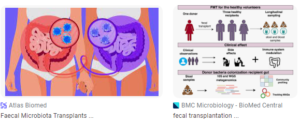News . Best Practices Students learn how to use valid evidence: much more impactful than a lab practical

This best practice reports an open schooling initiative about the science action Poo transplants. The action is based around the importance of the gut microbiome on overall health and encourages students to think critically about health claims. Students are asked to advise an obese friend on whether a faecal transplant could help him to lose weight. Scientists are invited to talk about recent research into the various ways gut microbiome link to physical and mental health. At home, families find out about the role of gut bacteria in health by playing a fun game based on the card game happy families. They also use an online quiz to find out how healthy their gut is. In this activity, there were 53 students who completed their science actions. This practice was developed by Northallerton School and Sixth form college located in Northallerton. It was supported by Mastery Science scientist team.
CARE: High engagement, students very interested in the topic and for many their first experience of learning about how science in the real world is tested. Students had the opportunity to make connections between science learned in the school to support in real-life decision making.
KNOW: Some great discussion about the validity of sources, students willing to argue for their opinions using evidence. Students use their knowledge of the digestive system, and the enquiry skill of judge quality of sources.
DO: Idea of valid evidence, placebos, range, sample size all beautifully covered in a way that made it much more impactful than a lab practical.
FINDINGS: Very little prior knowledge of how science works. Needed more than an hour. It fits in more with what we teach at ks4.
OUTCOMES: I don’t think they fit with the curriculum content that we teach, but it built on it beautifully and was much richer and extended and deepened thinking to make what we do teach more relevant.
Fifty- three students contributed to the open schooling research questionnaires. They mentioned that they would like to do more activities like this one. Most students practiced various skills including discussions and developing a project. They liked to use the Bunsen Burner, performing the experiments and work in groups with friends.
More details of our report: on this link.